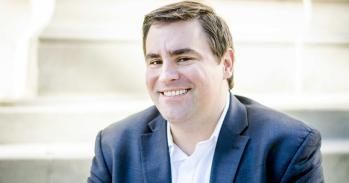
A consultancy project with grand designs is informing the structure of energy-efficient homes of the future.
A consultancy project with grand designs is informing the structure of energy-efficient homes of the future.
A consultancy project with grand designs is informing the structure of energy-efficient homes of the future.
Over 600 years ago Spanish builders knew how to design a house that would retain the natural heat of the winter sun and be cool in the summer. The techniques they built with, called tile vaulting, are being revived by Michael Ramage of the University’s Department of Architecture in a state-of the-art building that could be a prototype for cheaper energy-efficient homes.
The house, which was featured on Channel 4 Television’s Grand Designs, was designed by architect Richard Hawkes, with consultation on structural design by Michael Ramage and Philip Cooper, who is a Visiting Lecturer at the Department of Architecture and the Technical Director of Scott Wilson Engineers.
‘The inspiration to use the Spanish design came from my research into contemporary applications of historic construction methods,’ explained Ramage. The vaulting gives the house structural strength and obviates the need for embodied energy- intensive materials such as reinforced concrete. It also provides it with great thermal mass, enabling the building to retain heat and absorb fluctuations in temperature, reducing the need for central heating or cooling systems.
The roof, which is overlaid with gravel and soil, holds solar panels that generate 3,600 kwh of energy a year. Rather than buying electricity, the excess is sold to the National Grid. The heat from the solar panels is captured in a unique storage system in which a specially developed salt solution changes from solid to liquid in order to conserve heat. Ramage and Dr Allan McRobie (Department of Engineering) are monitoring the performance of the energy system to develop better ways to reduce demand.
The Consultancy Services of Cambridge Enterprise Limited set up and managed the contracts with Michael Ramage and with Scott Wilson Limited, acting as an intermediary party. This arrangement provides the academic with reduced personal risk and the ability to use the University’s name and facilities, which they are unable to do if acting in a personal capacity. Cambridge Enterprise enters into over 100 contracts annually with public and private sector organisations worldwide who wish to use the services of University of Cambridge academics.
For more information about this research, please contact Michael Ramage (mhr29@cam.ac.uk). For more information about Cambridge Enterprise Consultancy Services, please contact Dr Paul Seabright, Head of Consultancy Services (paul.seabright@enterprise.cam.ac.uk; www.enterprise.cam.ac.uk/).
This work is licensed under a Creative Commons Licence. If you use this content on your site please link back to this page.





